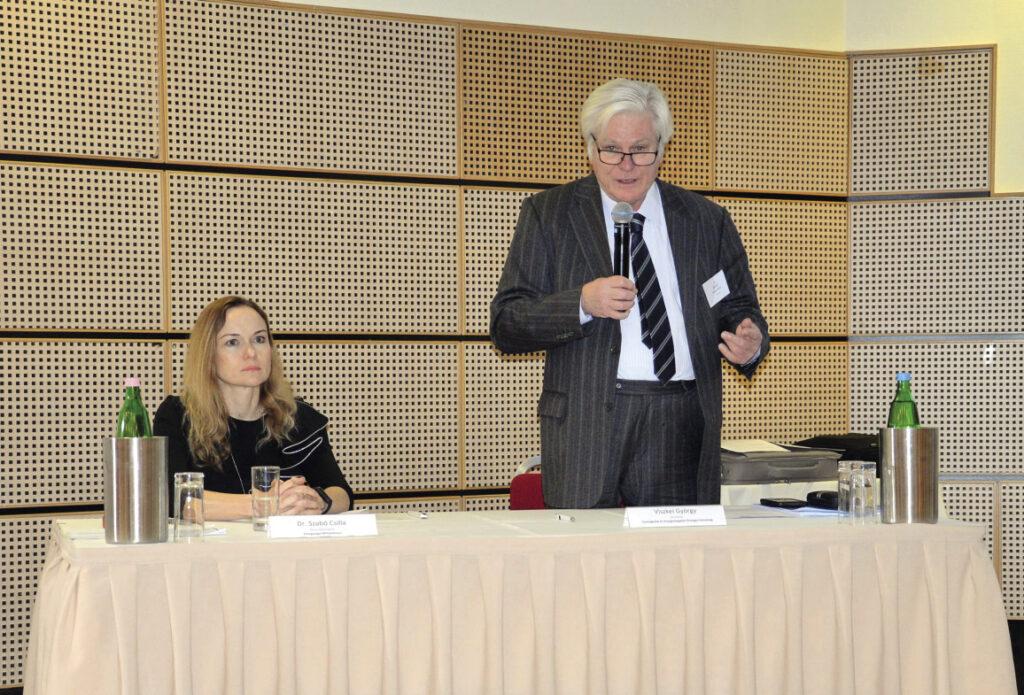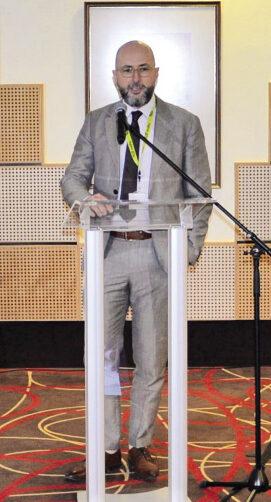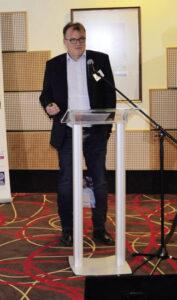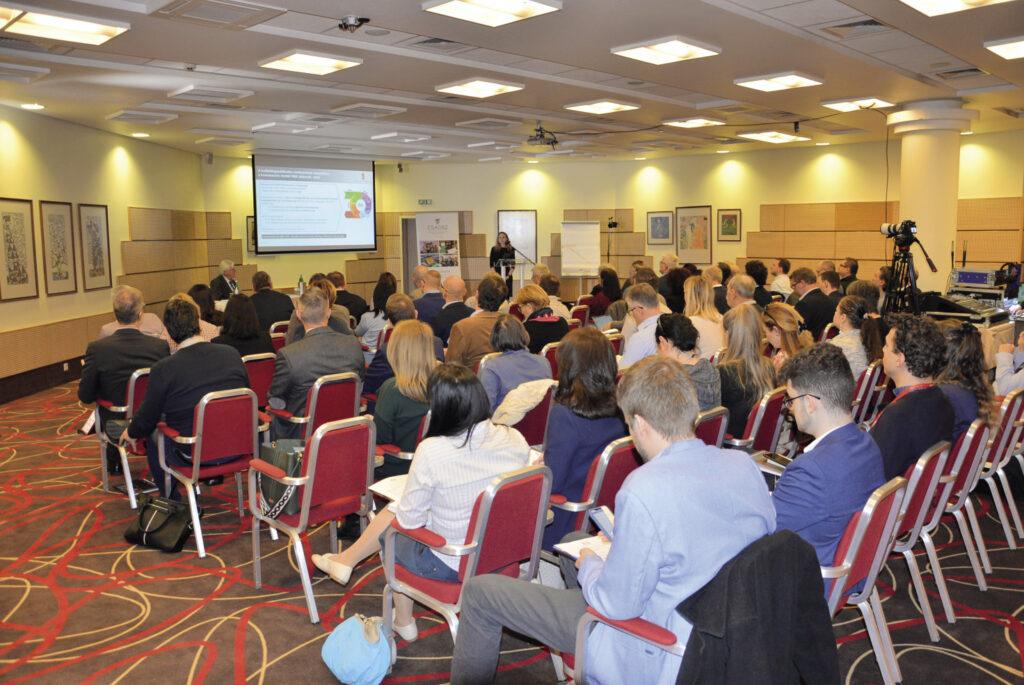One-way traffic!
Laws and regulations
On 22 February 2023 the Hungarian Association of Packaging and Materials Handling (CSAOSZ) organised a mainly legislation-themed conference in the Holiday Inn Hotel in Budaörs. 2023 and 2024 are bringing systemic changes in the world of packaging. In waste management Hungary has decided to introduce a concession system, the environmental tax system for packaging changes – a new actor appears in the process: the concession holder – and the role of the National Tax and Customs Administration (NAV) is also modified.

György Viszkei, co-president of CSAOSZ and dr. Csilla Szabó, head of department at the Ministry of Energy
CSAOSZ co-president György Viszkei opened the conference, who was also the moderator of the event. The first speaker was Dr Csilla Szabó, head of department at the Ministry of Energy. She explained that there are two main parts of the concession system (which debuts on 1 July 2023), one of these public service tasks – this is basically the same as the public service tasks done today, and the other is institutional tasks, which consists of three systems: waste from business organisations, extended producer responsibility (EPR), and the mandatory deposit return scheme from 1 January 2024.
The role of the concession holder
Next Endre Rónavölgyi, head of sales with MOHU MOL Hulladékgazdálkodási Zrt. stepped on the podium. He spoke about the changes in institutional waste management, compensations, consumer incentives, and the system of waste collection. MOL, the concession holder doesn’t plan to enter the market. The company would like those firms to carry on performing the tasks in the long run that are already present in the market.

Endre Rónavölgyi, head of sales at MOHU MOL
Tamás Blaubacher, marketing and regulatory affairs director of MOHU MOL Hulladékgazdálkodási Zrt. gave a presentation about the planned mandatory deposit return scheme. He revealed that the system will be different than the ones already used in other European countries. One of the differences is its coverage: in the first phase plastic, glass and metal beverage packaging will fall under its scope, typically from 0 to 6 litres, and it will include all drinks marketed in these types of container, with the exception of dairy products.

Tamás Blaubacher, marketing and regulatory affairs director at MOHU
MOL
Changes in the tasks of NAV
In the morning section Zoltán Tánczos, deputy head of department at the National Tax and Customs Administration (NAV) was the last speaker. He told the audience that the tasks of NAV will change in many areas, for instance it will be them who have to collect those product fees from which the sum of the producer responsibility fee is allowed to be deducted. In the new system there won’t be individual fulfilment –this will be incorporated into the producer responsibility fee instead, but to a very limited extent.

Miklós Nagy
secretary general
CSAOSZ
In the afternoon, the programme started with Miklós Nagy, secretary general of CSAOSZ talking about the modifications of the environmental protection product fee (Product Fee Act) since 1994. This act was one of the most frequently amended piece of legislation, which has basically turned into a “green tax” by now. The secretary general explained: from 1 July 2023 both the Product Fee Act and the extended producer responsibility (EPR) system will govern packaging waste management, so companies will have to prepare two different reports and pay two different fees to two organisations (NAV and MOL).
EPR categories
Beáta Gönci, a consultant of CSAOSZ and managing director of ÖKO-Pannon Nonprofit Kft. analysed the various categories falling under the scope of the EPR government decree and the Product Fee Act. She told that the Hungarian Energy Office will specify the EPR fee, based on different recommendations, and the sum will be announced for the first time on 31 May 2023. Then she talked about the obligation of manufacturers/waste mangers to register and report data, product fees, CSK codes, etc.
György Viszkei, co-president of CSAOSZ set out to introduce the Packaging and Packaging Waste Regulation (PPWR) of the European Union. He told that the European Commission (EC) thinks: if they don’t do anything, the volume of packaging waste will rise sharply. At the same time the EC also feels that it must protect the free movement of goods, which would suffer if member states introduced different packaging rules.

The conference on the changes in the packaging market attracted many attendants
Food packaging
Dr Blanka Szilvássy PhD, food safety officer of the National Food Chain Safety Office (NÉBIH) was the next speaker. She gave an insight into the changes of the European Union’s Food Contact Material Regulation. The EU has realised the problem that the rules governing food contact materials (FCM) aren’t harmonised, sometimes they are ambiguous and they help the work of neither manufacturers nor the authorities. Plus there are new challenges as well, such as the growing number of innovative new raw materials.
Beáta Gönci closed the conference with a presentation about the approaching deadline for preparing the single-use plastics (SUP) reports. She clarified very important definitions and told about consumption reduction that the first year about which data must be provided is 2022. This is the base year that needs to be submitted to the EU, and the consumption reduction targets must be reached by 2026. //
This article is available for reading in Trade magazin 2023/4.
Related news
The customer is the important to everyone, everywhere, at all times – We were learning together (Business Days 2024 Part 1)
Wednesday morning of the Business Days conference, the topic was…
Read more >Announcement of the National Association of Plant-Based Food Manufacturers and Distributors
NÉGYOSZ organized a pioneering professional event that focused on the…
Read more >Miklós Nagy: “The EPR system is moving too fast”
Our magazine interviewed Miklós Nagy, technical secretary of the National…
Read more >Related news
The Christmas season is starting earlier and earlier: value for money is the key
This year, 40 percent of Hungarians brought their Christmas shopping…
Read more >The SZÉP card will also be available in digital form from 2025
From September 1, 2025, a significant change will come into…
Read more >SHEIN’s first Hungarian store has opened
On December 10, 2024, at noon, SHEIN’s first Hungarian store…
Read more >








